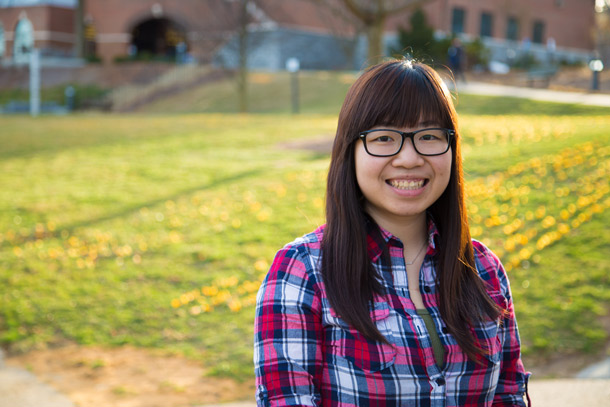For Huimin “Winifred” Yu, the Intensive English Program at Eastern Mennonite University served as a bridge between life in China and as a massage therapist and life as a budding English-language teacher.
Yu, a native of Canton in the south of China, holds a bachelors degree in business administration from Shenzhen University. In 2012, Yu came to the United States to join relatives. After a brief stay with relatives in San Francisco, Yu heard about Harrisonburg from her friend Wenjun “Wendy” Wu, a 2014 EMU nursing graduate .
After working briefly as a massage therapist in Harrisonburg, Yu wanted to return to school and IEP seemed a natural fit. Though initially reluctant to return to the classroom, Yu thought improving her English-language skills would be empowering.
“The program is a bridge for people like me, immigrants who are already educated,” she said, of her decision to enroll in IEP. “It is a bridge to connect my old life to my new life.”
What she didn’t realize was her participation would bring out qualities she didn’t know she possessed and lead her to a new vocation.
IEP started with a handful of students in 1989, says director Kathleen Roth, but its steady growth necessitated a move from a small building near the seminary into refurbished Roselawn quarters in 2012.
About 60 to 80 students take IEP courses each session, representing 15 to 20 different countries. Students spend 20 hours a week in small classes working on their reading, writing, listening and speaking skills. While beginning courses focus on fluency, upper-level IEP courses help international students with cultural differences, especially in the academic realm where most plan to continue their studies.
Chinese students will notice differences in academic expectations, Yu said, especially in terms of citation and plagiarism. “In China we still want an original idea, but we do not have the same rules. In China, we can use other people’s words and we do not need a citation.”
A cultural difference that may puzzle Chinese students, she says, is the emphasis on critical and creative thinking in the classroom. “When you write an essay [here],” she says, “you don’t need to follow the mainstream.” Learning, she adds, “is about more than just learning facts.” This freedom has encouraged her to explore new ideas beyond what she terms the “listen, understand, follow” creed experienced in her former academic setting.
With her improved English skills, Yu had planned to enroll at James Madison University to earn a master’s degree in business administration. However, as she progressed through the higher levels of IEP, Yu started to realize her passion lay in helping others to learn English, rather than in business.
For Yu, her new calling to empower immigrants through education is more than academic. “My mom is coming here – how will she learn English and how will she get a job? She could live in San Francisco or New York [speaking only Mandarin], but in a place like Harrisonburg, if you don’t know English, then you can’t do anything.”
After realizing her passion for teaching English, Yu made the decision to stay at EMU to earn a master’s degree in education. “I like the environment here. I like how they treat me here. There is a peacebuilding program and things like that. Even the MBA program [at EMU], which I was interested in before changing my major, has a course called ‘Common Good,’ which I think is unique.”
Despite being an IEP success story, the transition to graduate classes in a second language has not always been easy for Yu. “Reading and writing something professional involves a lot more than simple English,” she says. “Graduate-level papers require academic language and critical thinking.”
Yu works in the EMU cafeteria, as a Mandarin conversation assistant, and as a tutor for students at IEP.
There are several Chinese students who are alumni of IEP currently enrolled at EMU as well as several other Chinese students who came to EMU through other universities and high schools. No matter their origins, they are a close-knit group. Yu says the group gets together on a regular basis; they ushered in Chinese New Year with a party. “I am older than my friends by two or three years, but we are the same and they treat me the same.”
Yu says she would like to return to China as a visitor some day, but with her mother in the process of relocating to the United States and with her commitment to graduate studies and then teaching, Yu says her future will be here.
[Editor’s note: Concerning Winifred Yu’s reference to the challenge of transitioning from IEP to graduate classes in a second language, EMU has an academic support center, with tutoring in writing, available to students at no charge.]

We are happy Winifred is here in Harrisonburg! Nice article.
It’s a pleasure getting to know Winifred!